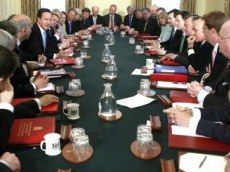
Political news stories can sometimes be confusing, especially when reporters refer to Parliament, the Government and the House of Commons all in the same story. So what’s the difference? Well we’ve already discussed the House of Commons, which is one of the two houses that makes up Parliament; the other being the House of Lords. The Government on the other hand, are a smaller group within Parliament and they are the people who run the country; you may also hear them referred to as the Executive.
The leader of the Government is the Prime Minister, who by extension is the leader of the political party that won the last election. The Prime Minister then appoints the remaining Government Ministers from amongst the members of his party within Parliament; ministers can be chosen from both the MPs in the Commons and the Lords in the upper house. For example, David Cameron is the Prime Minister and the leader of the Conservative Party, so when he came into power he had to choose Ministers for his Government. George Osborne sits in the House of Commons as the Conservative MP for Tatton, in Cheshire, and was appointed by Cameron to the position of Chancellor of the Exchequer – so Osborne is now a Minister in Government and is head of the department for economic and financial matters.
However, just to make things a bit more complicated, there is another group within the Government called the Cabinet. The Cabinet is a group of 22 Ministers within the Government who are the heads of the most important government departments; they are the most senior of the government ministers. Just to recap, the Government is a smaller group within Parliament and the Cabinet is a smaller group within the Government.

So we know how it’s broken up, but what do the Government actually do? The Government’s main responsibility is to implement and develop policies as well as draft new laws, but they are essentially responsible for every element of life in this country. The Government is divided into different departments, each run by a minister and each in charge of a different area of life; such as education, environment, employment etc. These departments are responsible for all new and existing policies on these areas, be they national issues or foreign affairs, meaning that they are responsible for improving these areas for the benefit of the public.
In short, the Government runs the whole country, from food to national security and everything in between. The Cabinet ministers deal with the most important departments and meet once a week to discuss current issues, but it is the government as a whole who are held responsible to the public. Hopefully this all makes more sense to you now, but remember, the best way to improve your political knowledge is to watch the news!

0 Comment:
Be the first one to comment on this article.